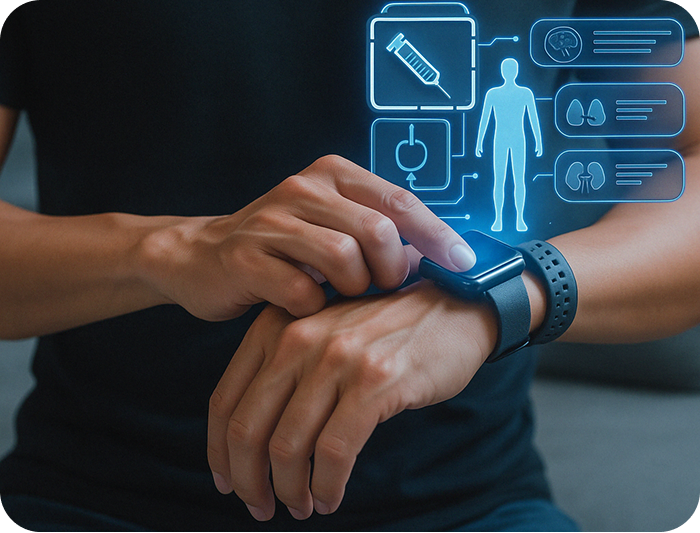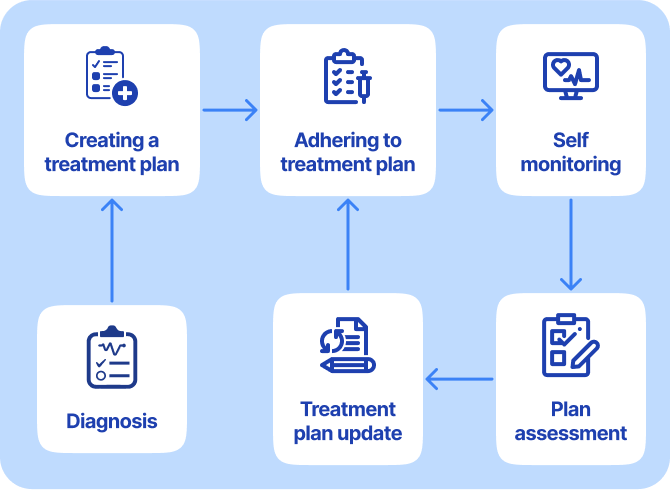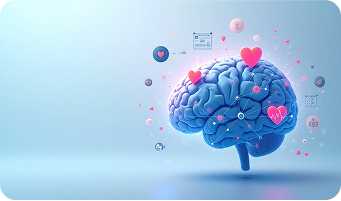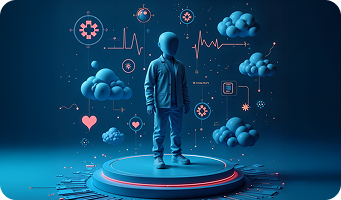Artificial Intelligence in Healthcare: A New Approach to Chronic Disease Management

Chronic diseases like diabetes, heart disease, and cancer affect millions of people globally and are some of the biggest challenges faced by modern healthcare systems. Did you know that adults as well as elderly people in India nowadays live with at least one chronic condition? A staggering reality is expected to grow in the coming years, putting even more pressure on healthcare providers, especially those who live in underserved and rural areas.
Artificial intelligence (AI) is a transforming technology that tackles these challenges head-on. With its ability to analyze data, provide real-time insights, and personalize care, AI-powered tools empower patients as well as healthcare professionals to manage chronic diseases in once unimaginable ways. Curious about how AI is reshaping healthcare? Keep reading!
Smart Wearables: Your Personal Health Assistant!

Imagine wearing a device on your wrist that tracks your fitness as well as acts as a personal health assistant! That’s the power of AI wearables. These devices now go beyond simple activity tracking as they monitor health metrics like heart rate, blood pressure, and blood sugar levels, providing users with real-time updates and alerts. Here’s how smart wearables are making a difference:
- Managing Diabetes: Continuous glucose monitors (CGMs) powered by AI offer blood sugar readings every few minutes. They can even predict changes based on meals, medication, or activity levels, allowing users to manage their diabetes with less hassle and more confidence.
- Heart Health Monitoring: AI-powered wearables can detect irregular heart rhythms and alert users to potential risks like atrial fibrillation. Early detection of such conditions can prevent serious complications, giving patients a critical edge in managing their heart health.
- Respiratory Conditions: Wearables designed for asthma and COPD track breathing patterns and oxygen levels. They can predict flare-ups and recommend preventive measures, helping patients avoid emergency situations.
These devices improve individual health management and serve as valuable tools for healthcare providers by supplying real-time data for better decision-making.
Remote Monitoring Brings Healthcare Closer to Home
For patients in rural or underserved areas, accessing healthcare can often be a struggle. Long travel times, fewer specialists, or overloaded facilities can delay treatments. But what if quality care could come to you, no matter where you live?
AI-powered remote monitoring systems make this possible. By integrating AI wearable devices, telehealth platforms, and advanced analytics, patients can connect with their healthcare providers without leaving their homes.
- Virtual Consultations: Through telehealth, patients can consult doctors online, saving time and travel costs while still receiving personalized care.
- AI-Driven Alerts: AI constantly analyzes wearable data to detect unusual patterns, such as rising blood pressure or irregular heartbeats, and sends alerts to patients and doctors for timely intervention.
- Real-Time Assistance: AI chatbots answer health-related queries, remind patients about medications, and provide tips for managing chronic conditions, boosting engagement and adherence to treatment plans.
By combining data from wearables with electronic health records (EHRs), healthcare providers can create comprehensive patient profiles, enabling more tailored and effective treatments.
The Role of AI in Diagnosis and Treatment
Artificial intelligence (AI) is not only assisting patients in monitoring their health but is also transforming the way diagnoses and treatments are approached.
In heart care, researchers are using AI to create personalized heart models that can predict cardiac events. This innovation enables doctors to develop individualized treatment plans, ultimately reducing the risk of complications.
For cancer detection, AI is emerging as a powerful tool. Studies indicate that AI can identify colorectal cancer more accurately than traditional methods, leading to earlier diagnoses and improved recovery chances for patients.
AI plays an essential role in preventing Type 2 diabetes. By analyzing health and lifestyle data, AI can identify individuals at high risk for developing the condition.
This early warning system empowers healthcare providers to suggest preventive measures, such as dietary changes and increased physical activity, before the disease develops.
Benefits of AI in Chronic Disease Management

The integration of AI into healthcare is bringing about transformative changes.
- Early Detection: AI continuously monitors health data to catch possible issues before they escalate, enabling faster interventions.
- Personalized Care: AI tailors treatment plans to the unique needs of each patient, improving outcomes and adherence.
- Improved Access: Remote monitoring and telehealth platforms break down geographical barriers, ensuring patients in rural areas receive quality care.
- Efficiency for Professionals: By automating administrative tasks, AI allows doctors and nurses to focus more on patient care.
- Better Decision-Making: AI combines real-time data with EHRs, giving healthcare providers a complete view of a patient’s health.
Overcoming Challenges in Implementing AI in Healthcare
AI has great prospects in healthcare, but some challenges need to be addressed to make the most of it. One important issue is data security, which is important for keeping patient information safe and maintaining trust.
Another challenge is accuracy, which requires careful testing of AI systems to prevent wrong diagnoses. There are also connectivity issues, as reliable internet is necessary for remote healthcare, especially in rural areas.
Affordability is a problem since advanced AI technologies can be too expensive for some communities. Overcoming these challenges will require collaboration between technology developers, healthcare providers, and policymakers.
What’s Next? The Future of AI-Powered Healthtech!
The future of AI in chronic disease management is incredibly promising.
- Innovative Wearables: AI-powered wearables will track a wider array of health metrics, including stress levels and hormonal changes. Wearable application development helps provide healthcare professionals with an exclusive picture of a patient's overall health, enabling more personalized care and timely interventions.
- Integration with Genomics: Combining AI insights with genetic information will enable truly personalized treatments based on an individual’s DNA.
- Smarter Virtual Assistants: AI chatbots will become even more advanced, providing 24/7 support for patients and helping them stay on track with their care plans.
- Seamless Telehealth Systems: The integration of AI with telehealth will make remote care even more efficient, accessible, and affordable.
AI is Set to Bring a Revolution in Healthcare!
AI is reshaping the way we approach chronic disease management, offering solutions that are smarter, faster, and more personalized than ever before. From AI-powered wearables that track health data in real time to predictive tools that identify at-risk individuals, the possibilities are endless.
As we continue to address challenges like data privacy and affordability, the healthcare industry has a unique opportunity to leverage AI for the betterment of all. Together, we can guarantee that everyone, regardless of location or circumstance supports access to high-quality care. Are you ready to embrace the future of healthcare? The AI revolution is here, and it’s promoting healthier lives every day.
Popular Blogs

Agentic AI-Driven Healthcare Revolution
Agentic AI in healthcare for personalised care and real-time decisions.

Artificial Intelligence in Healthcare: A New Approach t...
Chronic disease care with AI wearables, remote monitoring, and more.

AI and Hallucinations in Healthcare Field: A New Fronti...
Know how AI supports the detection and treatment of hallucinations.
